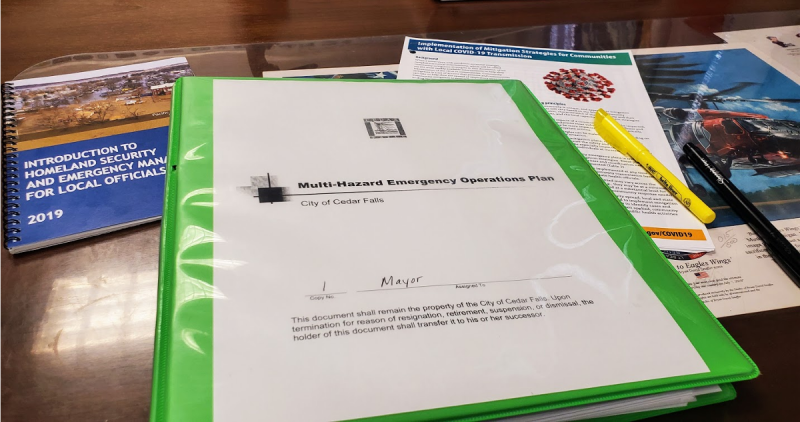
In the April 20, 2020 city council meeting, I spoke briefly about the current command and control process in City Hall for declared emergencies. Here are the citations for it, showing my understanding that the Mayor retains final authority for the execution of local government on behalf of the residents of Cedar Falls. I also note how some ambiguity appears to exist, which I will work with staff and council to resolve during my time as Mayor.
For starters, snder the Mayor-Council form of government, the Mayor is the city's designated Chief Executive Officer (CEO) and has final authority of execution of government services as granted by Iowa Law and the City code. The CEO role is specifically noted in the Mayor's Powers and Duties in the City Code:
City Code Sec. 2-187. - [Mayor] Powers and duties.
(a) Generally. The mayor shall be a conservator of the peace, and, within the limits of the corporation, shall have all the powers conferred upon sheriffs to suppress disorders. He shall be the chief executive officer thereof, and it shall be his duty to enforce all regulations and ordinances; and he may, upon view, arrest anyone guilty of a violation thereof, or of any crime under the laws of the state.
While the City Code describes the Mayor as the CEO, it appears to assign emergency response powers under the City Multi-Hazard Emergency Operations Plan to the Administrator, not the Mayor in Section 2-219:
City Code Sec. 2-219. - Emergencies.
(a)The administrator shall exercise all powers and authorities granted and outlined by the city's multi-hazard emergency operations plan.
(b) In case of accident, disaster, or other circumstance creating a public emergency, the city administrator may make purchases for the purpose of meeting said emergency; but the administrator shall file promptly with council a certificate showing such emergency and the necessity for such action, together with an itemized account of all expenditures.
The Multi-Hazard Emergency Operations Plan (last revised August 2015), which was largely drawn from a generic template applicable to all cities, specifically notes the role of "designated official":
III. Concept of Operations. B.1.b):
1. The City of Cedar Falls Mayor or designated official coordinates all emergency response actions.
...
5. The Mayor or designated official directs departments, agencies, and personnel to respond to the situation.
6. The Mayor or designated official issues directives as to travel restrictions on local roads and recommends protective actions if necessary.
I read the Code and supporting documents as directing the responsibility of the city's response efforts to the City Administrator rather than the Mayor. Similar ambiguity exists in the role of the Mayor and Administrator in regards to supervising staff generally; the City Code gives both positions the direct authority to do so in Section 2-187(b)(1) and Section 2-218(1). While this has not led to command and control problems (i.e. necessary things are getting done), I believe the ambiguity of the City Code leads to the potential for mis-steps and particularly in a fast-moving crisis (like the immediate response to an area tornado). In those potentially life-threatening situations, an organization cannot afford risking a diffusion of responsibility.
To that end, in a fast-moving crisis like a tornado impact, I would most likely exert emergency powers under Iowa Code 372.14 (2) and carry out directives to the city by proclamation, removing any ambiguity:
372.14 The mayor — the mayor pro tem:
2. The mayor may take command of the police and govern the city by proclamation, upon making a determination that a time of emergency or public danger exists. Within the city limits, the mayor has all the powers conferred upon the sheriff to suppress disorders.
It's important to note, though, that these emergency proclamations by the mayor only have effect for no more than 48 hours; at that point, by City Code, such restrictions or requirements would have to be continued through council resolution; it's in Section 16-133:
Sec. 16-133. - Termination of restrictions.
Any restriction promulgated in accordance with the provisions of this article will terminate automatically 48 hours after the mayor's declaration of a state of public emergency was issued or upon his issuing a declaration that a state of public emergency no longer exists, whichever occurs first; provided, however, that any or all of the restrictions promulgated by the mayor may be extended by successive resolutions of the city council for additional periods of time. The period of any one extension shall not exceed five days.
I firmly believe that the City Council, as the people's elected representatives, should be the deciding body in matters affecting civil liberties, and that mayoral emergency proclamations must only serve as a temporary 'band-aid' until the City Council has time to convene and decide. As of now, no aspect of the COVID-19 public health emergency has been so urgent as to require me to declare a public emergency and issue emergency proclamations. Council actions have been sufficient.
The above ambiguities in the City Code for the role of the Mayor and the Administrator merit close scrutiny. Soon after the COVID-19 emergency passes, the City Administrator and I will discuss and propose changes to the City's Multi-Hazard Emergency Operations Plan and potentially the City Code to better define the direct responsibilities and authorities of our two positions, particularly in crises. We both appreciate that, while emergency response requires operational flexibility and creativity, it also greatly benefits from organizational clarity (as seen from the effectiveness of the Incident Command System hierarchy) -- including the senior executive level.
Mr. Gaines and the city staff have performed admirably during this unprecedented time. The above ambiguities have been inconsequential largely due to City Staff's initiative, continual dialogue, and collaborative spirit with your City Council, other area stakeholders and me. That said, we will all actively use the lessons and experience from the current public health emergency to close any gaps in the definition of our roles, which will, in turn, strengthen the City's command, control, and communication efforts to best serve the people of Cedar Falls.
You've read to the end - you obviously have an interest in civics! Thank you for seeking to be an informed and engaged resident!
